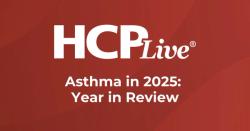
OR WAIT null SECS
Barbara Taylor, MD: Possibilities for Future Flu Vaccine Advancements
In this segment of Lungcast’s September episode, guest Dr. Barbara Taylor talked about the potential for a future universal flu vaccine as well as other potential advancements in the field.
During the newest episode of Lungcast, American Lung Association (ALA) chief medical officer and HCPLive Editorial Advisory Board member Al Rizzo, MD, discussed potential future advancements in influenza treatment with Barbara S. Taylor, MD, MS, assistant dean for the MD/MPH program and associate professor of infectious diseases at UT Health San Antonio.
After their discussion of respiratory syncytial virus (RSV) in the fall-winter season, during which high RSV transmission is a well-known occurrence, Rizzo discussed with Taylor the subject of the flu and the potential for a universal vaccine.
“I will say it's really exciting to work down the street from Texas Biomed, because it does really feel like we're on the cutting edge of a lot of new technology,” Taylor said. “For flu vaccination, our current situation is we get a new flu vaccination formula every year and that is based on a very educated guess, about what strains are going to be circulating. So that means that every year we have slightly different vaccine efficacy against whatever is circulating in the real world, and sometimes there are surprises.”
In the event of a universal flu vaccine, Taylor acknowledged this possibility would be amazing if it, in fact, could protect against all potential flu strains.
“However, the flu is very good at rearranging itself,” she said. “So we'll definitely need the same continued vigilance that we talked about for COVID and for RSV. And unfortunately, a universal vaccine doesn't mean we won't have seasonal flu and that it can't escape like it did in 1918. But it would be amazing to have a vaccine that was reliable over years.”
Following this discussion, Taylor was asked about her thoughts on some of the advances in respiratory pathogen prevention as well as therapies that she hopes clinicians could have in her lifetime.
“I put these things in sort of two categories,” she said. “And I am going to attempt to predict the future. Again, (with) all the caveats. I think probably the most important thing we need is to make sure that when we have new vaccines or preventative modalities, like the amazing wealth that we have right now, we make sure that they can get to people who need them most. And that is an advance in and of itself.”
Taylor further elaborated that those who need them the most is a category that includes individuals living in crowded settings, who are incarcerated in long term care facilities. She also pointed out the specific indication for the monoclonal antibody and nirsevimab for American Indian or Alaska Native populations.
“Are we doing the appropriate outreach, and confronting all of the misinformation that you mentioned, to make sure that communities who most need these modalities have access?” Taylor said. “Are working on structural barriers like cost and delivery? And that's important not just in the United States, but globally. If we want to see 1 million hospitalizations from RSV, then we have to get the shots out to more than a million potential people who need them.”
Taylor later noted that COVID-19 demonstrated to the scientific community how quickly a respiratory virus can sweep across the globe and how important it is to pay attention to both the US and to what's happening globally, as well as how important equity is.
“So that's one sort of bucket of things,” she said. “The other bucket is the amazing new technology bucket and there's much more to come. I think in terms of scientific advances, they're going to be more monoclonal antibodies both for treatment and prevention. That's really exciting because I'm all for prevention. Like I mentioned, I am very pro-public health, but we definitely need more options for RSV treatment.”
Lungcast is a monthly respiratory health podcast series from the ALA produced by HCPLive.
Subscribe to Lungcast on Spotify here or listen to the latest episode below:


